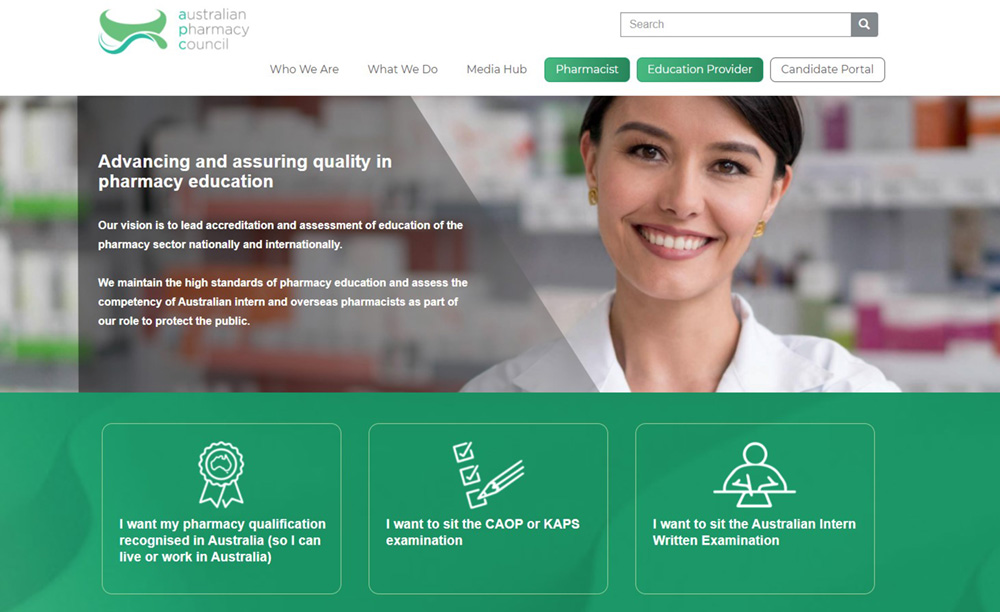Putting People First
This past year saw APC stretch capabilities and collaborate endlessly to enhance our processes.
We redesigned services that will serve us well into the future, and we centred this around one thing – the people we serve.
We will always aim to adapt our services to meet the evolving needs of our stakeholders and staff. Not only through pandemics, but always.
Enhancing the intern year experience
Intern Year Blueprint and Workplace Assessment Tools
APC and the Pharmacy Board of Australian (PharmBA) have a shared vision to improve preceptor and intern experiences by providing a range of tools that can be used for assessment and feedback. Early this year, we published a revised Intern Year Assessment Blueprint. The blueprint suggests a number of methods that can be used to assess interns depending on the purpose and context of assessment.
Guided by a team of experts from Australia and New Zealand, we developed a suite of tools and accompanying guidance.
The initial suite of tools comprises assessments from the Intern Year Assessment Blueprint, including:
- In-training assessment (ITA) activities
- Case-based discussion (CbD)
- Entrustable Professional Activities (EPAs)
These structured assessment tools aim to:
- support intern learning and reflective practice
- help preceptors provide better feedback to interns
- improve interaction and time spent between preceptors and interns to support intern learning.
As quality assurance leaders, we are committed to producing pharmacists fit for now and the future. Supporting preceptors and interns throughout this challenging period will ensure that interns are achieving the performance outcomes necessary for general registration.
 We value the contributions and input from all our stakeholders who have offered their time and expertise towards this project.
We value the contributions and input from all our stakeholders who have offered their time and expertise towards this project.
Consultation and piloting of the proposed tools
We conducted a consultation process to receive their feedback on the usability and practicability of proposed new tools for intern pharmacist assessment and feedback.
This included workshops and an online survey.
“The day for us was very informative and the feedback will assist us to develop tools that will be workable for interns, supervising pharmacists and preceptors. We appreciate the robust engagement of those present and their very astute appraisals of the draft tools” – Glenys Wilkinson, Executive Director Professional Services.
We will now pilot the tools in hospital and community pharmacies in the Australian Capital Territory, Victoria and South Australia between August and October 2021.
Supporting our candidates through the pandemic
To ensure they could sit their exams during the pandemic, we introduced online proctored exams for both the Intern Written Exam and CAOP exam candidates. With the key aim to keep candidates safe from the pandemic this initiative also provided them more choice and flexibility.
Notably, this change allowed for over 1300 interns to become fully registered and contribute to caring for their communities, including the COVID-19 vaccination roll-out in 2021.
Intern Written Exam
In October 2020, our exams team completed the task of re-engineering our Intern Written Exam. This culminated in our largest intern exam session to date. Candidates now had the option to sit their exam either in a test centre or remotely.
This online proctored delivery was well received and serves as a guarantee to the public that we are committed to quality in pharmacy education.
This initiative involved new test theory and a redesigned blueprint. To maintain public safety whilst modernising the exam we:
- reduced the exam length to combat ‘virtual-fatigue’
- developed multiple papers to address security issues
- introduced Rasch modelling to ensure fairness.
Candidates performed equally well irrespective of the delivery mode.
“The online proctored exams were a big success. The similarities of scores between the two groups means we have an equal and fair process across the two delivery modes,” – CEO Bronwyn Clark
Our priority will always be our candidates and stakeholders. Their health and safety and that of our community will always come first.
Here’s a message from our CEO, Bronwyn Clark in July 2020.
CAOP exam
After the success of the online proctored Intern Written Exam, we extended this delivery mode to eligible CAOP candidates from the United Kingdom, Canada, Ireland and the United States.
This pivotal change offers more flexibility to those who may have otherwise traveled substantial lengths to sit the exam. Prior to this, the CAOP exam was only held in test centres throughout London, Australia and New Zealand.
Additionally, we made changes to the exam paper. We review our exams often so that they remain fit for purpose.
Changes to the CAOP exam include:
- decreasing the exam session to 2 hours, instead of 3 hours
- limiting the exam paper to 70 questions in total
- removing the short-answer question
- removing the mandatory sub-scores to pass the exam – candidates only need to achieve an overall pass mark
Extension of validity period for KAPS and CAOP skills assessment letters
To reduce the impact of delays to candidate journeys due to COVID-19, we extended the KAPS and CAOP validity period by an additional twelve months for candidates whose Skills Assessment letters were issued between 2017 and 2020.
For example, a Skills Assessment letter issued on 1 July 2020 will be valid until 1 July 2024.
Candidates will not require an updated Skills Assessment letter to reflect the extension, as the PharmBA and Ahpra have been notified.
Safeguarding the wellbeing of education providers, students and interns
 New tools and processes
New tools and processes
We are committed to safeguarding the wellbeing of individuals involved in our accreditation activities. During COVID-19, support to our education partners who were under resource constraints for extended periods was critical. We did this whilst ensuring that programs delivered to students continued to meet the requirements of the Accreditation Standards, the PharmBA, and the needs of the pharmacy profession.
In collaboration with the Health Professions Accreditation Collaborative Forum, we adapted our accreditation tools and processes, such as conducting virtual site visits instead of face-to-face.
We also met with Heads of Schools and the President of the National Australian Pharmacy Students’ Association to fully understand what they needed from us and to best support them.
Moving SET member training online
We introduced virtual training modules for on-boarding Site Evaluation Team (SET) members, who help us assess and accredit pharmacy programs. These modules provide background into the accreditation process and practical knowledge, tips and experiences from previous SET members and other stakeholders. We would like to express our sincere thanks to our training module contributors for their valuable insights and guidance for our new SET members.
Our online cultural safety training modules is under development and we look forward to notifying SET members as soon as it is available. This work is in collaboration with other Accreditation Councils to develop a commonality of approach and reduce any impact on providers of differing approaches to assessment of cultural safety training.
Improving our website
Our website underwent a major redesign to provide users an improved, streamlined experience. We moved from a business needs approach to user-centered navigation.
The APC is one of many key steps along the journey to becoming a pharmacist in Australia. This step is a life-changing process for candidates and can be stressful and nerving. The aim of our new website is to reduce stresses for candidates and modernise our information for education providers.
Major improvements included:
- implementation of a ‘decision-tree’ questionnaire that directs users to the correct information based on their needs
- complete review of content to achieve plain English content
- improved search function
- upgraded media hub providing latest news, podcasts and blogs
- improved resources section
- streamlined exam dates and centres and accreditation information.


